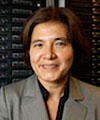$11.7 million grant funds the University of California San Diego’s Center for Admixture Science and Technology
As hospital leaders continue to address disparities in healthcare, they will be interested to learn about a new center that will build a genetic database that includes individuals with diverse ancestries.
Using an $11.7 million grant award by the National Institutes of Health (NIH) in the fall, the University of California San Diego School of Medicine has established the Center for Admixture Science and Technology (CAST). Admixture refers to a blending of populations from multiple ancestries.
CAST will build a genetic database that includes individuals with diverse ancestries, ensuring the inclusion of these backgrounds in precision medicine research.

“A large number of people living in America are likely admixed, so we would be excluding a large portion of our community if we were not taking these mixed genomes into account,” said Lucila Ohno-Machado, MD, PhD, in a news release. Ohno-Machado is a Distinguished Professor of Medicine at UC San Diego School of Medicine, Chair of the Department of Biomedical Informatics at UC San Diego Health, and a founding faculty member of the Halıcıoğlu Data Science Institute at the university.
According to UC San Diego’s program description, the goal of the CAST program is to improve the clinical utility of genetic information for all populations living in the U.S. CAST has three aims:
1. Develop and apply multivariate models of disease risk prediction that incorporate local ancestry and complex variants.
2. Conduct scalable distributed computing using data from millions of individuals.
3. Develop new approaches to characterize phenotypes using electronic health records and surveys, while assessing and prospectively evaluating the impact of including social determinants of health.
Much Genetics Data is Rooted in European Backgrounds
While the scope of precision medicine goes further than just providing treatments that factor in the genetic differences between individuals, genetics does play a core role in precision medicine research.
Much of the existing genetics data used for individualized treatments comes from people with European ancestries. There is a deficiency of genetic information that includes other ancestry types or mixtures of multiple diverse backgrounds.
The “lack of genomic data from people of other backgrounds makes it harder to accurately predict their health outcomes,” UC San Diego wrote. “Even less is known about the genomes of admixed individuals whose DNA reflect multiple ancestries.”
NIH funds are also being used elsewhere to further diversity efforts. In 2021, VCU Health in Virginia received a $3 million grant to address the disproportionate effects of lung cancer on Black communities.
The bottom line is that data disparities are only part of the problem. Socio-economic and regional aspects also affect precision medicine choices. Therefore, emerging resources like CAST may help better position hospital leaders to ensure equity in their precision medicine offerings.
—Caleb Williams
Related Information:
University of California (UC) San Diego School of Medicine
New Research Center Brings Genomic Medicine to Individuals of Admixed Ancestry
Virginia Receives its First Specialized Program of Research Excellence Grant
Program Description Center for Admixture Science and Technological Populations
